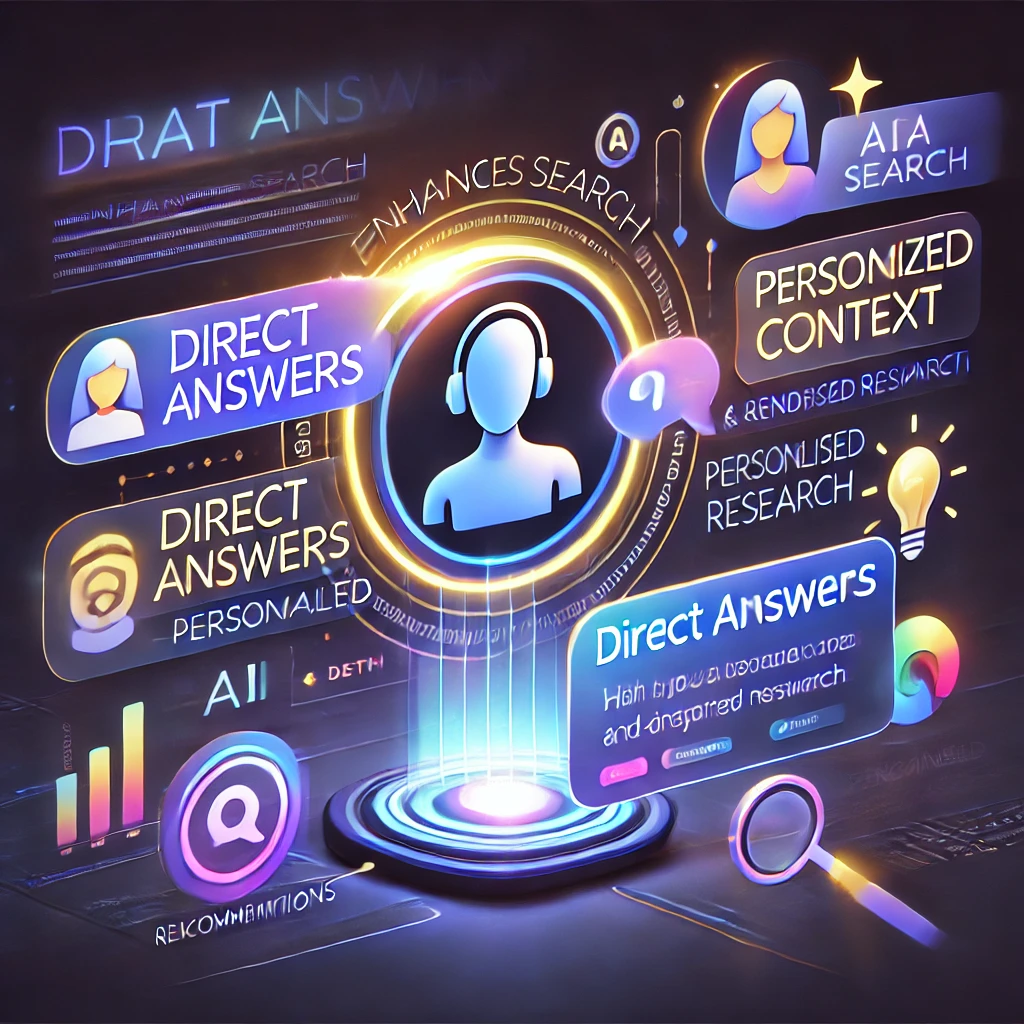ChatGPT as a Search Engine: The Future of Online Search
Imagine going to Google or Bing, typing a question, and scrolling through pages of links. Now imagine asking an AI-powered tool the same question and getting a clear, concise answer instantly – no scrolling required. Welcome to the world of ChatGPT as a search engine. In this post, we’ll explore how ChatGPT redefines search by offering fast, contextually rich responses tailored to what you’re really asking.
Why ChatGPT as a Search Engine?
Traditional search engines are great at giving us options, but what about answers? If you’re like most people, searching often feels like wandering through a library where every book is just a chapter on your topic. ChatGPT, however, aims to be your friendly librarian – delivering not just links, but full answers, explanations, and personalised responses that cut down your research time.
What’s Different About ChatGPT?
Let’s break it down: Traditional search is a bit like looking at a huge menu with hundreds of options. ChatGPT is like a helpful server who knows your preferences and brings exactly what you’re hungry for. Instead of providing pages of search results, it uses its conversational skills to pinpoint what you’re asking for and delivers it with context, relevance, and sometimes even a bit of wit!
How Does ChatGPT Enhance Search?
Here’s how ChatGPT shines in various search scenarios:
1. Direct Answers: If you want to know, say, "What are the key takeaways from Elon Musk's latest talk?", ChatGPT provides a straight answer. No need to sift through article after article.
2. Personalised Context: ChatGPT remembers your questions from earlier in the chat. If you first ask about setting up a business and then follow up with “What about market research?” it knows you’re still talking about business.
3. Expanded Search Abilities: ChatGPT’s capabilities go beyond basic Q&A. For example, you could ask for recommendations on productivity apps or insights into specific industries, and it gives you more than just links – it suggests options based on the latest trends.
4. Research Partner: Need more than just a quick answer? ChatGPT can help walk through complex concepts or act as a brainstorming buddy to help you frame ideas or conduct research, much like a study partner.
---
When to Use ChatGPT Over Traditional Search Engines
Using ChatGPT instead of a traditional search engine can be game-changing in situations where you need:
In-depth explanations for complex topics. Instead of reading multiple articles on “how blockchain works,” ChatGPT can break it down with analogies that make sense.
Recommendations and comparisons. From travel destinations to productivity tools, ChatGPT can suggest options and explain why one might suit you better than another.
Quick decisions and productivity. Say goodbye to scrolling and focus on making decisions. ChatGPT acts like a reliable assistant that summarises options quickly, so you can save time.
---
Limitations: Where Traditional Search Engines Still Lead
While ChatGPT is great, it’s not perfect for every search scenario:
1. Real-Time Data: ChatGPT’s information isn’t always current. For things like live sports scores, stock market updates, or breaking news, traditional engines or news platforms are more reliable.
2. Broader Searches: If you’re just exploring a general topic or looking for a wide variety of sources, search engines excel at showing you all angles.
3. Specialised Resources: Academic, legal, or technical sources like Google Scholar or JSTOR are unmatched for specific research needs.
How ChatGPT Search Enhances Business Decisions
For professionals and business owners, the rise of conversational search means less time hunting for information and more time acting on it. ChatGPT can help you:
Generate ideas for marketing campaigns or blog posts
Research competitors or industry trends quickly
Plan team meetings, brainstorm, and even schedule workflows based on best practices ChatGPT shares
Let’s say you need to prepare a presentation about AI trends for an upcoming meeting. Instead of reading numerous articles, just ask ChatGPT for the latest trends and boom, you’ve got a summary ready to go!
Why Conversational Search is the Future
In a world increasingly focused on user experience and personalisation, ChatGPT-like search tools are likely the next big leap. Imagine a future where you barely type but simply ask your AI what you need – and it responds, even showing visuals, summarising lengthy documents, and tracking your unique interests over time. It’s like having Alfred, Tony Stark’s AI assistant J.A.R.V.I.S., or even R2-D2 at your fingertips.
This AI-driven approach to search also promises to make learning more accessible and intuitive. Like a good tutor, ChatGPT understands where you’re coming from and helps you along the way, making it especially valuable for complex or unfamiliar topics.
Ready to Embrace the Future of Search?
If you’re curious about how ChatGPT-style search tools can change the way you find information, try experimenting with conversational queries. Rather than entering a one-word search like “marketing,” try something specific: “What’s the most effective digital marketing strategy for small businesses?”
Using ChatGPT or similar AI-driven search engines has significant implications on SEO, marking a shift from traditional SEO strategies focused on ranking web pages to optimising content for direct, conversational answers. Here’s how:
1. Shift from Keyword Matching to Contextual Content
In a traditional search, keyword density and backlinks have been central to ranking. However, ChatGPT-style engines rely on understanding intent and context rather than strict keyword matching.
To rank well with conversational AI, content needs to be informative, structured, and comprehensive. It should answer potential user questions directly and with clarity, making it easy for the AI to identify it as relevant.
Creating topic clusters and covering all facets of a topic helps ensure content is viewed as valuable by AI-driven systems that seek out well-rounded answers.
2. Enhanced Demand for High-Quality, Informative Content
ChatGPT's approach prizes quality and depth over keyword optimisation. Content that answers questions precisely and effectively is likely to gain visibility in an AI context.
AI-based search engines thrive on sources that provide trustworthy and authoritative information. Sites that invest in quality – publishing well-researched articles, citing reputable sources, and maintaining expertise on topics – are positioned for long-term SEO success.
3. Optimising for Featured Snippets and Direct Answers
AI systems like ChatGPT favour content that resembles Google’s featured snippets – content formatted to provide direct, concise answers.
Content creators need to structure pages with clear headings, bullet points, and question-answer formats. This layout helps AI detect and pull relevant segments to satisfy user queries.
Incorporating FAQ sections, answer boxes, and rich content like tables and lists can make it easier for conversational AI to “digest” and use your information.
4. Reduced Click-Through Rates (CTR) for Traditional Search
Since ChatGPT delivers answers within the interface, CTR for organic links might decrease for certain informational searches. Users might be less inclined to click through to websites if they get the answer directly.
This trend means businesses must focus on creating more compelling, in-depth content that encourages users to seek further insights, possibly by including enticing summaries or prompts to learn more about complex topics.
5. Importance of Brand Authority and Trust Signals
AI-driven tools weigh trustworthiness and authority heavily in selecting answers. Businesses with a strong online presence, quality backlinks, and recognised expertise in their fields are more likely to be “quoted” or referenced by the AI.
Building brand authority – through thought leadership, consistent publishing, and engaging content on popular platforms – becomes critical as conversational AI models look for credible sources.
6. Focusing on Long-Form and Evergreen Content
AI tools prefer evergreen content that remains relevant over time. Long-form, detailed articles that provide in-depth explanations tend to be valued higher by AI as they can address a wide range of potential user questions in one place.
Businesses should consider producing comprehensive guides, tutorials, and resource hubs on topics relevant to their audience. This type of content not only appeals to AI but can also create lasting value by regularly bringing users back to the site.
7. New Opportunities for Local and Niche SEO
ChatGPT-style AI still has limitations in handling hyper-local and highly niche content, which leaves an opportunity for traditional SEO tactics in these areas.
Local businesses can continue to benefit from Google My Business listings, local backlinks, and community engagement to appear in location-specific searches that conversational AI might not yet fully serve.
---
The Bottom Line: Adapting SEO for an AI-Driven Search World
In an AI-dominated landscape, SEO strategies need to focus more on user-centric, high-value content that’s conversational, easy to parse, and authoritative. Businesses that prioritise quality over quantity, adopt a Q&A approach, and establish strong brand authority will be well-positioned as conversational search continues to evolve. Embracing these shifts can ensure businesses remain
visible – and valuable – in the AI-driven future of search.
And if you’re a business leader interested in how AI search might enhance productivity and drive smarter decisions, you’re in the right place. Here at DESS, we’re all about helping businesses harness cutting-edge tools for smarter workflows and strategies. With advancements like ChatGPT, we’re excited to help companies optimise processes and unlock efficiencies they may not have imagined.
Whether you’re exploring for fun or using ChatGPT to power up your business, conversational search might just be the upgrade we’ve all been waiting for. As they say in tech circ
les: “The future is already here – it’s just unevenly distributed!” And ChatGPT is helping make that future a little closer.


